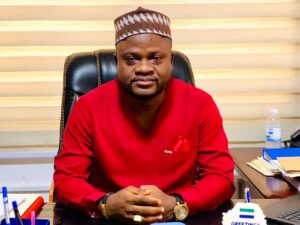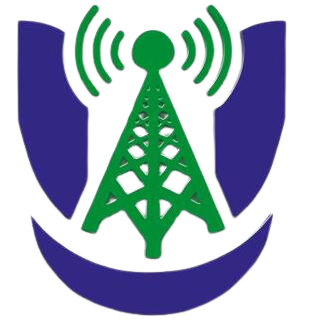Current Board Members
Universal Access is a mandate of the ITU from a WTO recommendation to all member states of the UN as the most feasible means of bridging the digital divide which exists between rural and urban communities. The Telecommunications Law of 2007 mandates the LTA to implement the universal access program.
- Board Members
- Roles & Responsibilities
- Implementation Unit
- Project Implementation Unit
- History
 Patrick Honnah
Patrick Honnah
Patrick Honnah, a professional communicator, works at the Liberia Telecommunications Authority as acting commissioner responsible for consumer affairs, universal access and public affairs. Commissioner Honnah holds a BBA in Management, MA in International Relations and MPA in Public Sector Management. He has served as Deputy Director General at the Liberia Broadcasting System, Communications Manager at Firestone Liberia, and lead host of the famous Truth Breakfast Show on Truth FM 96.1. He is the founder of Punch FM 106.7. He brings many years of experience serving as Manager both in the public and private sectors in Liberia.
 Laureine Guilao (Chief Executive Officer of TipMe Liberia)
Laureine Guilao (Chief Executive Officer of TipMe Liberia)
Laureine Guilao is the Chief Executive Officer of TipMe Liberia, the first app-based mobile wallet in Liberia. An entrepreneurial leader with 15 years of experience spanning multiple industries (hospitality, telecoms, and financial services) and countries (USA, Nigeria, and Liberia), she is passionate about building relationships, teams and strategies to elevate organizations. Of Liberian and Guinean origin, Laureine has a particular interest in promoting the growth and development of West Africa.
Laureine is a graduate of Spelman College (BSc in General Science), Columbia University (BSc in Civil Engineering), and University College London (MSc in Urban Development Planning). She started her career at Ernst & Young and has served on the executive teams of MTN, 355 Group, and Kifalme Investments.
 George M. Sherman
George M. Sherman
George M. Sherman is a Liberian IT Professional with a Bachelor of Science Degree in Information & Communications Technology. He is a results-focused, persistent and collaborative individual with excellent managerial, verbal and written communication skills. He currently serves as Assistant Director of IT at the Ministry of Finance and Development Planning, a position he has held since 2018. In this role, George provides technical support for the implementation of key PFM reforms to include the Electronic Funds Transfer (EFT), Donor Funded Projects (DFP), IFMIS Budget module, Electronic Document Management System (EDMS) etc.
Prior to this role, he served as Information Security Specialist and Network Administrator at the same Institution. Before coming over at the Ministry of Finance & Development Planning, formerly Ministry of Finance, George worked as at IT Specialist with Odebrecht Exterior Services Limited, a Brazilian company. George has over fifteen (15) years of technical experience in Information and Communications Technology. He has acquired numerous professional certifications and undergone several trainings in Certified Ethical Hacking (CEH) with Advanced Penetration Testing, Implementing & Operating Cisco Security Core Technologies (SCOR), Securing Networks with Cisco Firepower (SNCF), Certified Information Systems Security Professional (CISSP), Security Information and Event Management (SIEM), Cisco Networking Academy CCNA Routing & Switching, Cisco Certified Network Professional Switching, etc.
 Edna Thompson
Edna Thompson
Edna Thompson is a strategic and innovative leader with over 13 years of experience in the telecom’s industry. She spent most of her career in the commercial and marketing areas serving as a customer care manager, product development specialist, customer experience manager, marketing consultant and has excellent qualifications in business operations.
She has been instrumental in designing strategies and supporting companies to improve performance, growth, and employee engagement- Also served as the business manager to the CEO’s office of Lonestar Cell MTN, Leading all aspects of the strategy and operations of key parts of the business. Her role afforded her the opportunity to work on key projects to include:the design and implementation of the Y’ello scholars & graduate training program to create a pool of future talent for the business and the MTN Women program creating a platform for empowering women in the business to identify areas for self improvement . Edna holds a master’s in public administration, a bachelor in sociology and several certificates aimed at developing her management and operational skills.
Edna Thompson currently serves as the Country Manager for CSquared Liberia, CSquared is a technology company making commercially driven investments into broadband-enabling infrastructure and unlocking the development potential of information and communications technology (ICT) in Africa. Recruited to drive business continuity, she is working to maintain the company’s position by installing commercial growth, cultural, and organizational effectiveness programs.
Throughout her career, Edna has built a reputation as a thought-leader on women leadership, innovation and marketing strategies.
She is passionate about mentoring and coaching teams for better results.
Primary role and responsibilities:
As defined in the UAF Regulations, the Governing Board is the formal governing authority for the UAF, responsible for approving the “high level vision and agenda for achieving the provision of Universal Access in Liberia”. The Board has oversight and approval responsibility for the UAF’s budget and planning, and for review of monitoring and evaluation reports.
Key functions:
Specific functions and activities that the Board must undertake to fulfil its role include the following. Further details of these functions are defined in the relevant sections of this Operations Manual.
- Provide high-level guidance to Implementation Committee on development of UAF Strategic Plan, including overall vision and objectives for activities and outcomes; review and approve final Strategic Plan.
- Review and approve the recommendations of the Committee on scope of services and geographic areas that are un-served and under-served.
- Review and approve Annual UAF Workplan and Budget (“Budget”) as submitted by the Implementation Committee; focused on ensuring consistency with the Strategic Plan and with ICT sector policies.
- After review and approval, submit the Budget developed by the Implementation Committee to the Minister of Finance for inclusion in the annual budget of the Executive for approval by the National Legislature.
- Appoint and oversee a firm of independent auditors;
- Review and approve the quarterly Monitoring and Evaluation Report submitted by the Implementation Committee.
- Review and approve the UAF Annual Report, submitted by the Implementation Committee.
- Participate, as appropriate, in public events and stakeholder forums involving UAF activities and policy, to support visibility and publicity of the Fund’s accomplishments and objectives.
Primary role and responsibilities:
The role of the Implementation Committee is to serve as the main management body for the UAF, with direct oversight responsibility for the development and implementation of UAF related plans, programs, and projects, as well as financial management and stakeholder relations.
Key functions:
The main functions of the Implementation Committee are as identified below, with particular attention to the Committee’s reporting obligations to the Board. Any or all Committee functions may be delegated to or assisted by the Project Implementation Unit, as the technical and operational arm of the Committee. Further details of these functions are provided under the PIU section and in subsequent sections of this Operations Manual.
- Develop the UAF Strategic Plan, including proposed priority UAF objectives and programs, scope of services and determination of geographic areas that are un-served and under-served, with guidance from and for approval by the Board.
- Prepare the UAF Annual Work Plan and Budget, including proposed projects and disbursements to be undertaken during the operating year, subject to Board review and approval.
- Approve a standard format for the quarterly Monitoring and Evaluation Report for use by the PIU. Provide input to, review and approve the quarterly Monitoring and Evaluation Report prepared by the PIU. Submit the report quarterly to the Governing Board for approval.
- Prepare and submit the UAF Annual Report, based upon the quarterly Monitoring and Evaluation Reports, for Board review and approval and public dissemination.
- Appoint, manage, and oversee all the functions and responsibilities of the Project Implementation Unit.
- Provide guidance to the PIU on methodologies and tools for research and analysis to identify un-served and under-served areas suitable for UA funding.
- Provide guidance to the PIU on the frequency that project assessments shall be undertaken.
- Review, approve, and oversee all aspects of UA projects and contract development and implementation, as undertaken by the PIU.
Primary role and responsibilities:
The role of the PIU is to undertake the day-to-day implementation tasks necessary to accomplish the UAF’s objectives and to ensure effective and flexible coordination and implementation of the UA projects under the management of the Implementation Committee. These include full-time activities that address all of the main UAF related functions as identified below. The PIU shall report directly to the Implementation Committee, and prepare reports, documents, and advisory inputs as directed by the Implementation Committee, and act as the functional arm of the Implementation Committee in all substantive matters involving the UAF.
The personnel to be assigned to the PIU will be determined by the Implementation Committee, after consultation with the Governing Board, and should be sufficient for the PIUto carry out the range of pertinent tasks and responsibilities as listed below utilizing internal or externalresources:
- Project Coordination
- Market Research
- Legal
- Procurement
- Monitoring and Evaluation
- Finance and Accounting
- Administrative Support.
Key functions:
The PIU shall carry out most of the operational functions required to implement the UAF’s mandate and objectives, as further elaborated in the subsequent sections of this Operations Manual. The specific tasks required for each functional area should be assigned to appropriate personnel, including outside support as necessary, to ensure both reasonable allocation of resources and efficient completion of all UAF related responsibilities. The main functions that the PIU shall undertake include the following:
- Collect data and conduct market research in support of UAF planning and project development, and maintain updated awareness of the status of Universal Access in Liberia.
- Undertake research and analysis, for example surveys and geographical information system (GIS) mapping, to identify un-served and under-served areas suitable for UA funding, following instructions and guidance provided by the Committee.
- Provide research and analytical input to the UAF Strategic Plan, and prepare drafts of the Plan for review and approval by the Implementation Committee, and subsequent submission by the Implementation Committeeto the Board.
- Prepare drafts of the Annual Workplan and Budget, including analysis of market conditions, forecasts of UAF budgets, and proposed projects to be implemented in accordance with Strategic Plan targets; submit for review and approval by the Implementation Committee, and subsequent submission by the Committee to the Board.
- Conduct stakeholder consultations for all major UAF related activitiesin cooperation with the LTA, to ensure adequate communication with and input from key public and private sector stakeholders, in accordance with procedures and principles described herein.
- Develop UA project designs and issue tender documents consistent with the approved annual plans, taking account of inputs from consultations and including all technical requirements and related elements to be delivered by successful bidders.
- Manage all aspects of the competitive procurement processes to select UA project contractors, consistent with Liberian procurement legislationand regulations, and the principles described herein.
- Subjectto approval by the Implementation Committee, prepare project award documents and draft contracts for UA project bid winners consistent with the UAF Regulations and the Public Procurement and Concessions Act of Liberia.
- Undertake ongoing monitoring and evaluation of all UA project contracts, including verification of project progress and related disbursements from the Fund, review of and response to compliance issues, monitoring of results and impact of each project and any corrective actions required for implementation. Prepare quarterly Monitoring and Evaluation Reports for review by the Implementation Committee and subsequent submission to the Board.
Content loading please wait …

